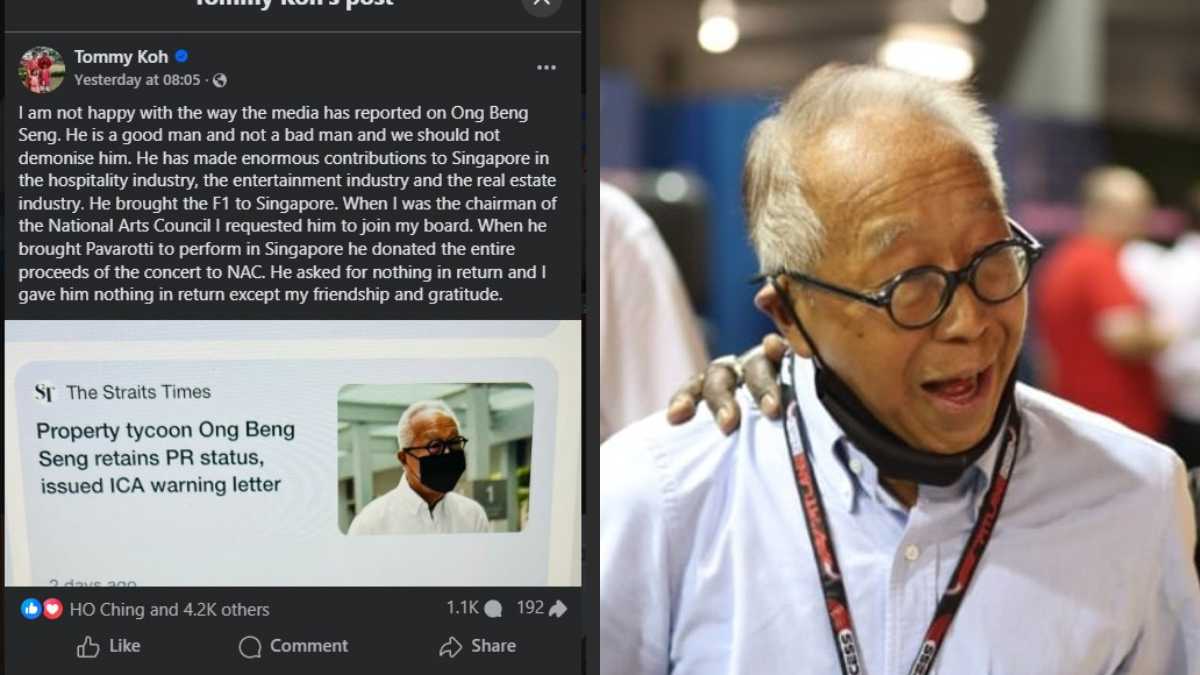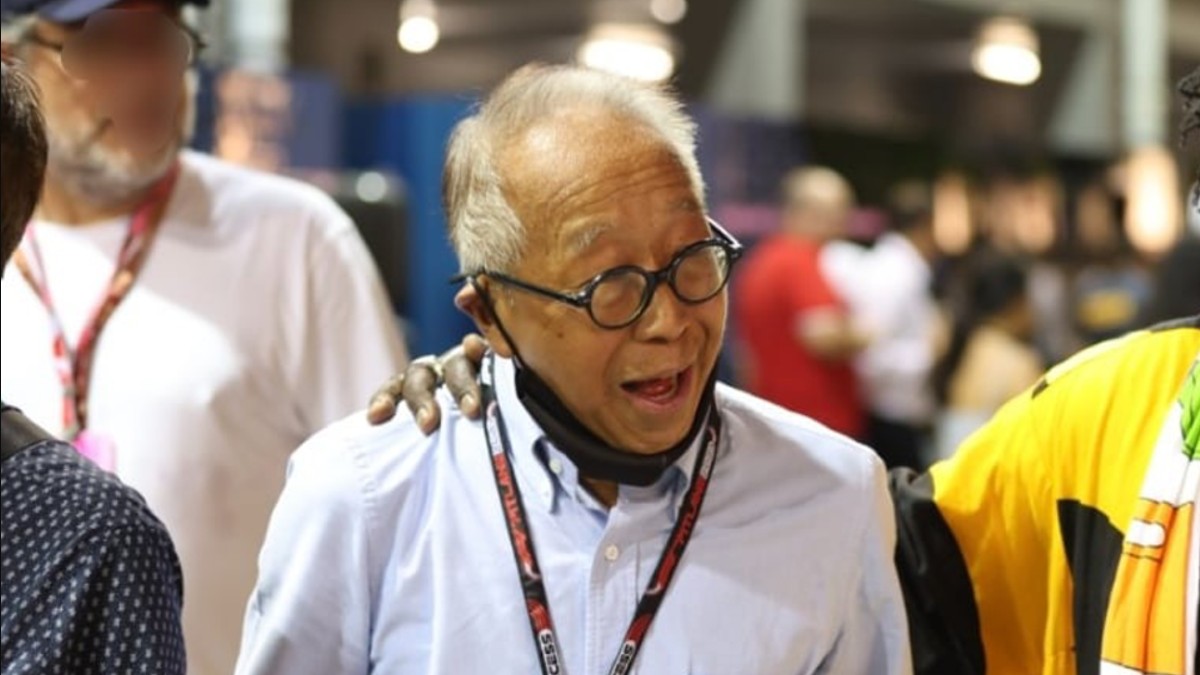Calvin Cheng defends balanced approach in OBS PR case as netizens flag fairness, inequality concerns
Calvin Cheng has defended Singapore’s “balanced” approach in handling Permanent Resident cases, responding to debate over tycoon Ong Beng Seng retaining his PR status. While some agreed with his view, many questioned whether wealth and influence affect fairness in such decisions.

- Calvin Cheng defended Singapore’s balanced approach to Permanent Resident (PR) decisions amid debate over tycoon Ong Beng Seng’s case.
- Netizens expressed contrasting views, raising concerns about fairness and elite privilege.
- Cheng urged critics to assess Singapore’s system objectively, distinguishing between judicial and immigration decisions.
SINGAPORE: Former Nominated Member of Parliament Calvin Cheng weighed in on property tycoon Ong Beng Seng’s permanent resident (PR) status, following confirmation from the Immigration & Checkpoints Authority (ICA) on 10 November that Ong would retain his PR.
Cheng’s comments came after Professor Tommy Koh, special adviser to the Institute of Policy Studies at the National University of Singapore (NUS), expressed disapproval of what he perceived as unfair media coverage of Ong.
Prof Koh described Ong as “a good man” who should not be demonised despite his recent legal troubles, highlighting his contributions to Singapore’s hospitality and arts sectors, as well as his charitable work.
The post referred to Ong’s conviction earlier this year for abetting obstruction of justice in relation to investigations involving former transport minister S Iswaran. Ong was fined S$30,000 in August 2025.
Koh’s remarks subsequently sparked strong public reactions.
Cheng: Authorities consider contributions and context
In a Facebook post on 12 November 2025, Cheng acknowledged public frustration over Ong retaining his PR, noting that some perceived double standards and alleged that the rich and powerful receive special treatment.
Cheng argued that when authorities decide whether to revoke a PR, they consider not only the crime committed but also the individual’s contributions to the nation.
“I think OBS’s contributions are well known. Besides F1, he has contributed to charity, NGOs and civil society.”
He added that contributions by ordinary PR holders are also taken into account.
Cheng cited the case of a PR who, despite not being wealthy, had performed extensive voluntary charity work over the years.
“This was considered, and he was given a chance,” Cheng said.
Cheng contrasted this with well-to-do expatriates whose PR status was revoked due to misconduct during the COVID-19 pandemic.
“They were expelled from Singapore and had their PR revoked,” he noted.
While acknowledging that inequality exists in the world — with the rich and powerful having access to better lawyers, doctors, and opportunities — Cheng urged critics to evaluate Singapore’s system objectively.
“But when we knock Singapore’s system, let’s do it objectively and not out of mere envy,” Cheng wrote.
Public calls for fairness as critics question privilege and systemic inequality
Observing comments on Cheng’s Facebook post, some echoed with Cheng, argued that Ong has already faced justice through criminal prosecution and punishment. They noted that immigration decisions differ from criminal law, as authorities can consider extra-legal factors like contributions to society.
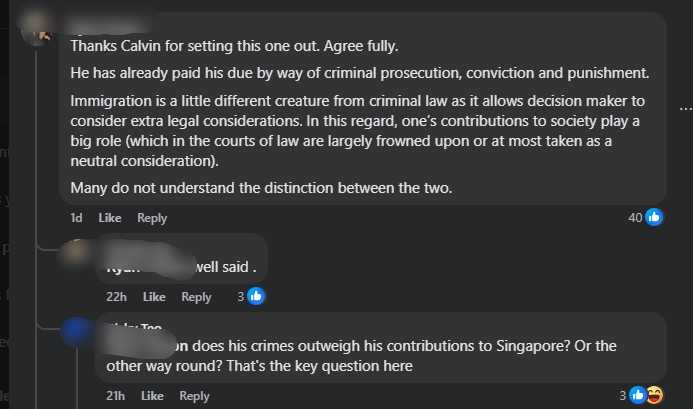

Howvever, Several netizens countered that Ong’s contributions also benefited him personally, and unlike ordinary Singaporeans who make mistakes, he may receive leniency due to his status.

Some argued that while contributions matter, the seriousness of his crimes, including corruption and bribery, makes retaining his PR contentious.
A comment opined that even though the formal charges were light, the overall situation was damning, and the decision could harm Singapore’s reputation more than his contributions help.
Cheng responded by comparing Ong’s offence to that of ex-minister Iswaran, noting that Ong did not personally enrich himself, suggesting the offence may not be as serious as critics claim.
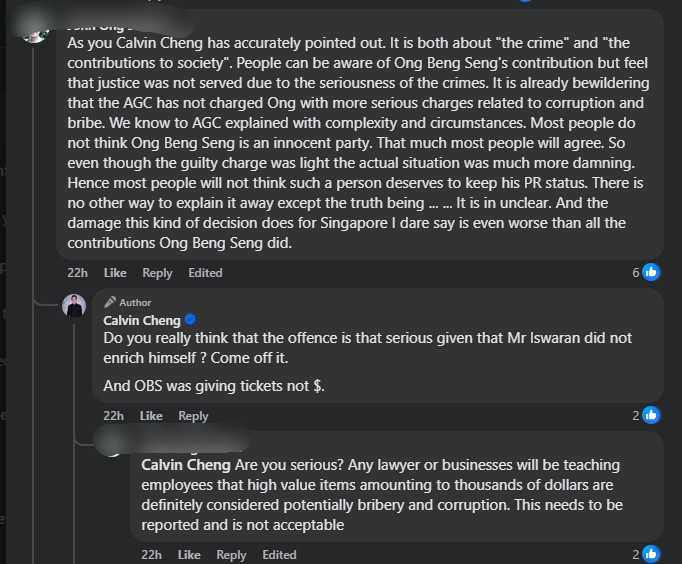
A netizen mocked that serving in the army doesn’t place anyone above the law, criticising Cheng’s comments on Ong.
Cheng replied that Ong’s lighter sentence was due to health reasons, not contributions, and emphasized that ordinary obligations, like military service, are not “special contributions.”
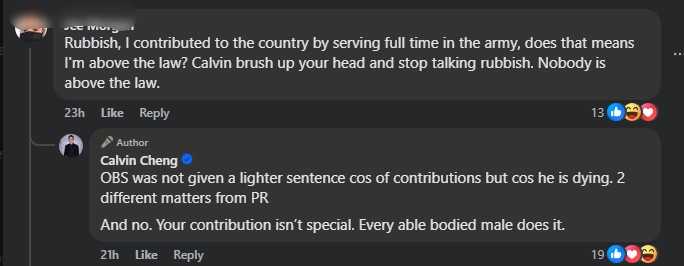
A netizen argued that common laws mainly apply to ordinary people, while elites are treated differently due to their societal contributions.
Cheng countered, explaining that there is no law governing PR revocation, and reiterated Ong received judicial leniency in court because of his health condition.
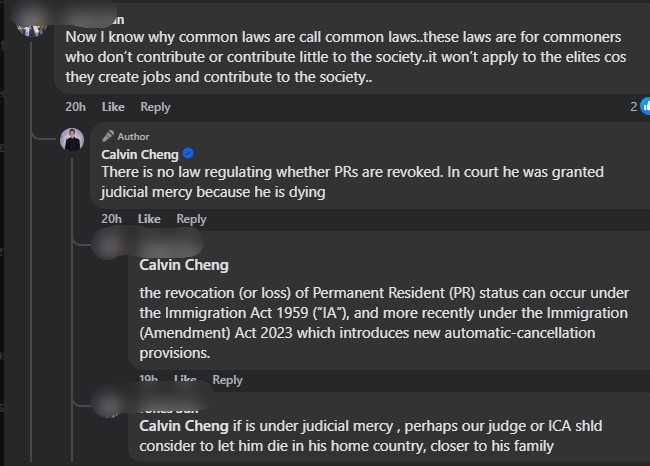
A netizen argued that while inequalities naturally exist, government systems should aim to address them, and Singaporeans expect fairness from their own government.
The comment added that public concern reflects care for the country, but over time, apathy may grow and complaints may fade.

Ong’s business legacy shadowed by past controversies
Ong’s public image has long been mixed, shaped by both his success and his controversies.
The 1990s condominium discount episode remains a lasting mark, even after official clearance.
International scrutiny arose from a 2018 investigative report by the Organised Crime and Corruption Reporting Project (OCCRP), which alleged that Hotel Properties Limited had bypassed public tender procedures when leasing two islands in the Maldives.
The report further claimed that part of a US$5 million lease payment for Fohtheyo Island was channelled through associates of then Maldivian vice-president Ahmed Adeeb. Ong did not respond to those allegations.
Born in Malaysia in 1946, Ong moved to Singapore at age four. He began his career in international insurance underwriting, working across Europe and Southeast Asia before joining Motor & General Underwriters Investment Holdings.
In 1972, he married Christina Fu, daughter of businessman Peter Fu, and later joined her father’s oil trading firm, Kuo International. The oil price volatility of the 1970s helped Ong build capital, leading him to establish HPL in 1980.
Through HPL, Ong expanded into property and hospitality, developing numerous hotels worldwide and along Singapore’s Orchard Road.
He is widely recognised for his role in bringing the Formula 1 Grand Prix to Singapore, a move that bolstered the nation’s status as a global events hub.


